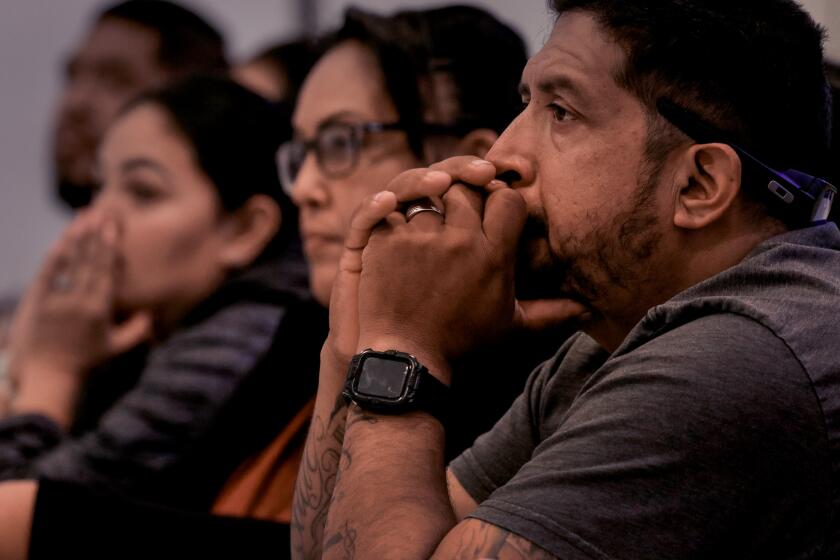Some donors wrapped up in embattled Silicon Valley congressman’s ethics complaint are helping him fight it
Reporting from Washington — Some of the very political benefactors whose names are involved in an ethics complaint against Rep. Mike Honda are helping him defend against it.
Three donors who recently contributed to the Silicon Valley congressman’s legal defense were Dr. Ngai Nguyen of San Jose, who gave $5,000; attorney Sukhan Kim, who also gave $5,000; and Dr. Gloria Wu of San Jose, who gave $1,000. Their names also appear on a donor list that is part of an ongoing ethics investigation of Honda.
Honda’s general election opponent, Democrat Ro Khanna, has made the ethics investigation a central issue of his campaign. The two will appear on the ballot for the second time this November in what has been a closely watched race — Khanna bested Honda in the primary by just more than 2,000 votes and had a more than 2-1 fundraising advantage.
Khanna’s supporters filed the original ethics complaint against Honda after a September 2014 report on the politics website San Jose Inside revealed emails between Honda’s chief of staff and his campaign manager discussing the guest list for an official State Department meeting in 2013 that the congressman was hosting.
In the emails, they discussed who should be invited to the event based on whether they had or might contribute to Honda’s campaign, a list they called the list of “1,000 Cranes,” which San Jose Inside first reported and published. (“1,000 Cranes” was Honda’s term for the donors who gave more than $1,000 to his campaign, and apparently a play on a Japanese legend that promised a gift from the gods to whoever folded 1,000 origami cranes.)
There is “substantial reason to believe” Honda and his congressional staff used taxpayer resources to benefit his campaign, the House Office of Congressional Ethics said last year, in part by providing opportunities to certain supporters. The separate House Ethics Committee is conducting its own investigation based on those findings. It has not decided whether Honda violated House rules and hasn’t set a deadline to do so. Honda’s campaign manager Michael Beckendorf said it shouldn’t be surprising to see longtime supporters backing the congressman’s legal defense.
“Let’s be clear, the ‘1,000 Cranes’ list was a nickname Congressman Honda gave to his donors,” he said. “Many, many, many members of Congress have such lists.”
Khanna’s campaign spokesman said the fact that the same donors are contributing to Honda’s legal defense shows how deeply beholden Honda really is to donors.
“Mike Honda’s high-end donors are funding his legal defense against charges that he illegally provided special favors to his high-end donors?” spokesman Hari Sevugan said. “This is just another sign that Congressman Honda is more beholden to the PACs, lobbyists and special interests that fund him than fighting for the people that elected him.”
The investigation into Honda has been ongoing for a year, and he’s spent nearly $200,000 on legal fees. His separate legal defense fund has existed only since January, when he got permission for its creation from the House Ethics Committee.
Since April, 24 people, nonprofits or businesses donated $36,950 to Honda’s legal defense fund and $32,000 was paid to two Washington law firms, according to his fund’s quarterly financial report.
Two organizations also gave $5,000 each, the maximum contribution allowed: Stevens Creek Chrysler Jeep Dodge in San Jose and the International Brotherhood of Electrical Workers’ PAC Voluntary Fund in Washington.
Several contributions come from California businesses including Acellent Technologies of Sunnyvale, which gave $2,000; Lori’s Diner International in San Francisco, which gave $1,000; and Zette Postpartum in Los Angeles, which gave $500.
The legal defense fund’s initial report, which came out in late April, showed the congressman raised just $1,750 from three donors and had not spent any of the money.
Fewer than a dozen House members have such funds, which they can use to pay for legal services for themselves or any staff member. The donations are considered gifts under federal law. Unlike campaign contributions, which are capped at $2,700 per individual each election, donors can contribute up to $5,000 to the defense fund.
Follow @sarahdwire on Twitter
Read more about the 55 members of California’s delegation at latimes.com/politics
ALSO:
November intraparty showdown could unseat longtime Silicon Valley congressman Mike Honda
Silicon Valley congressman raised less than $2,000 for legal defense amid ethics probe, spends $0
Updates on California politics
More to Read
Get the L.A. Times Politics newsletter
Deeply reported insights into legislation, politics and policy from Sacramento, Washington and beyond. In your inbox three times per week.
You may occasionally receive promotional content from the Los Angeles Times.











